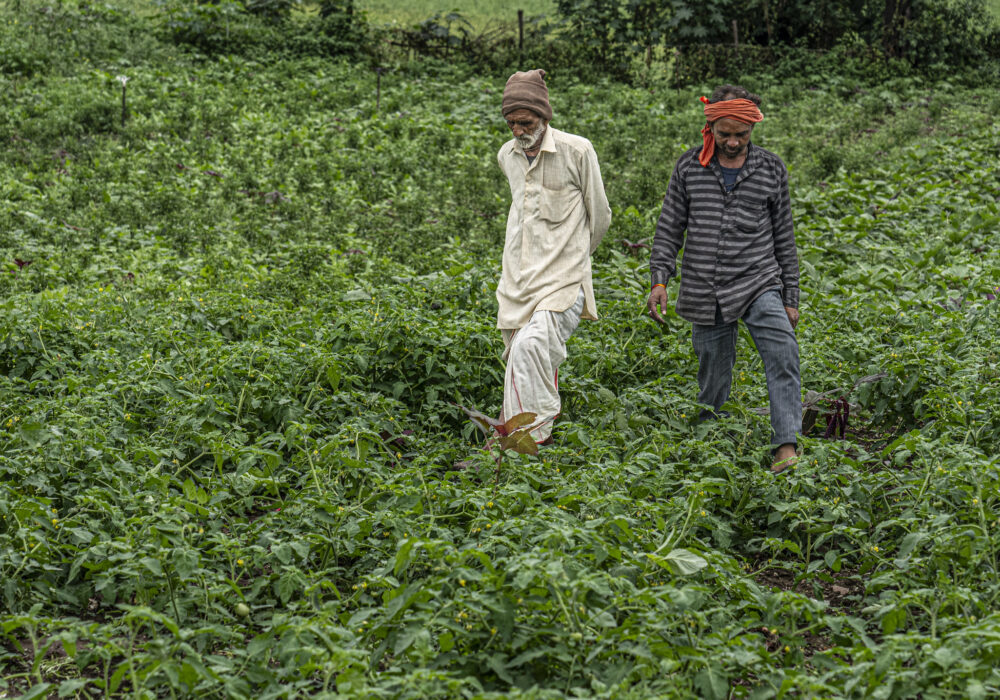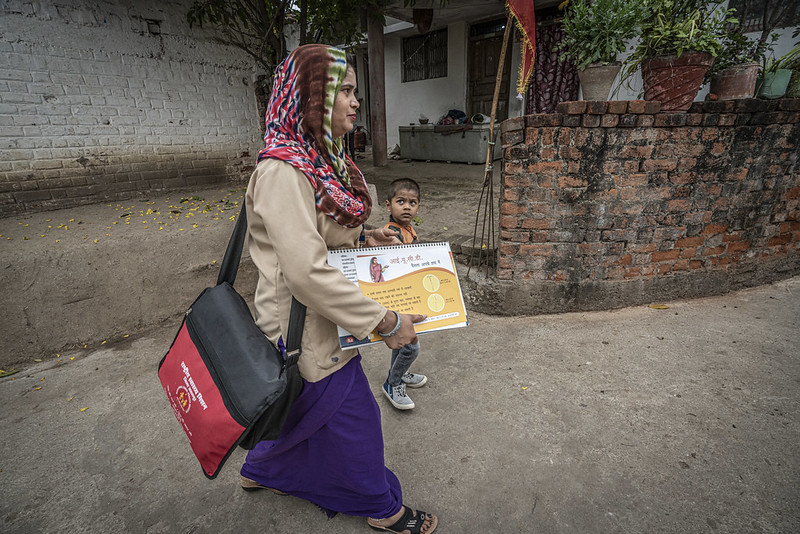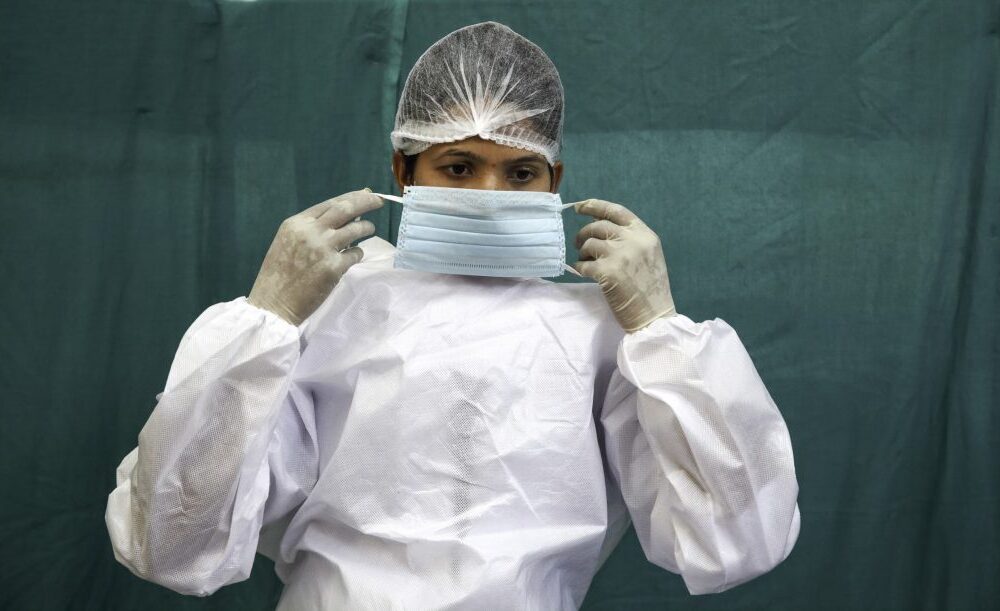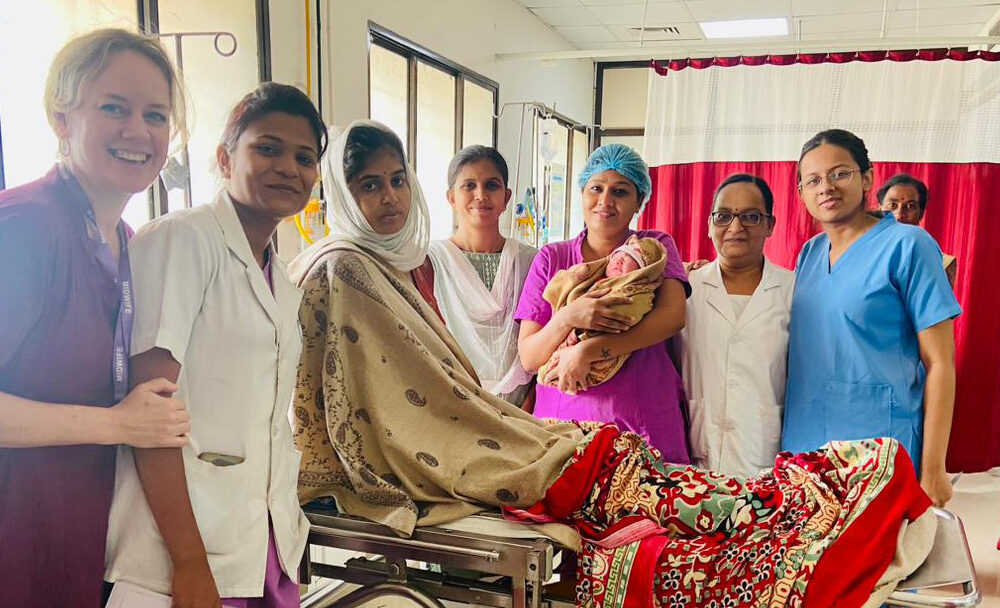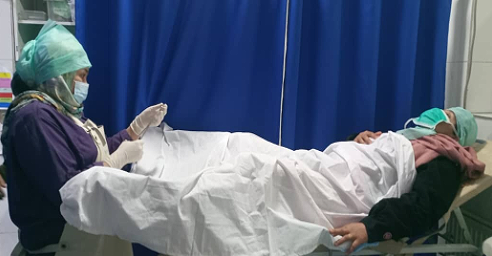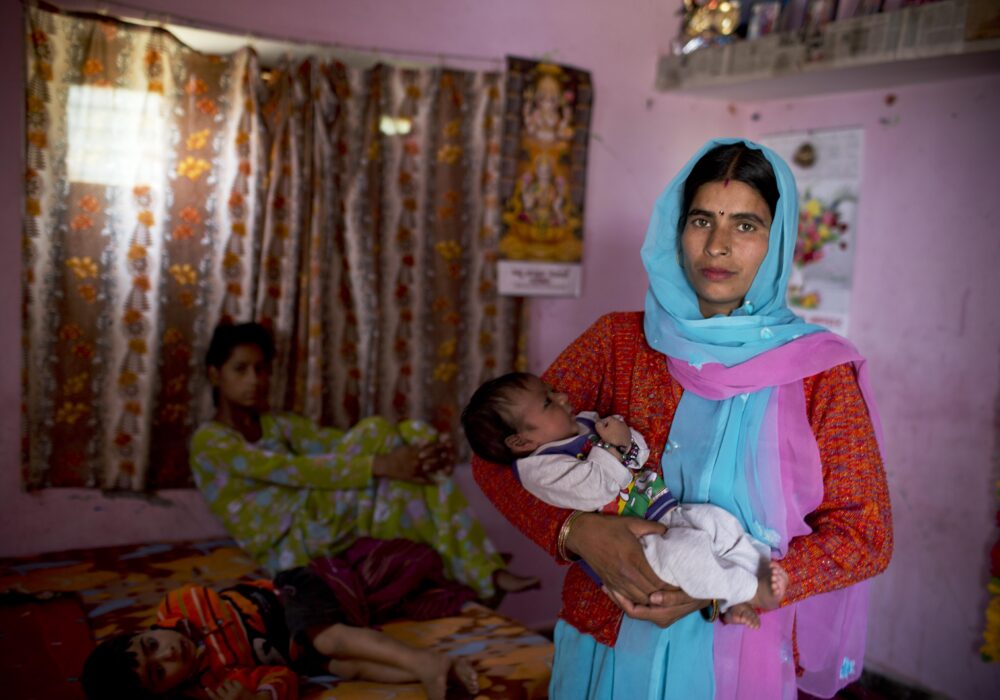India


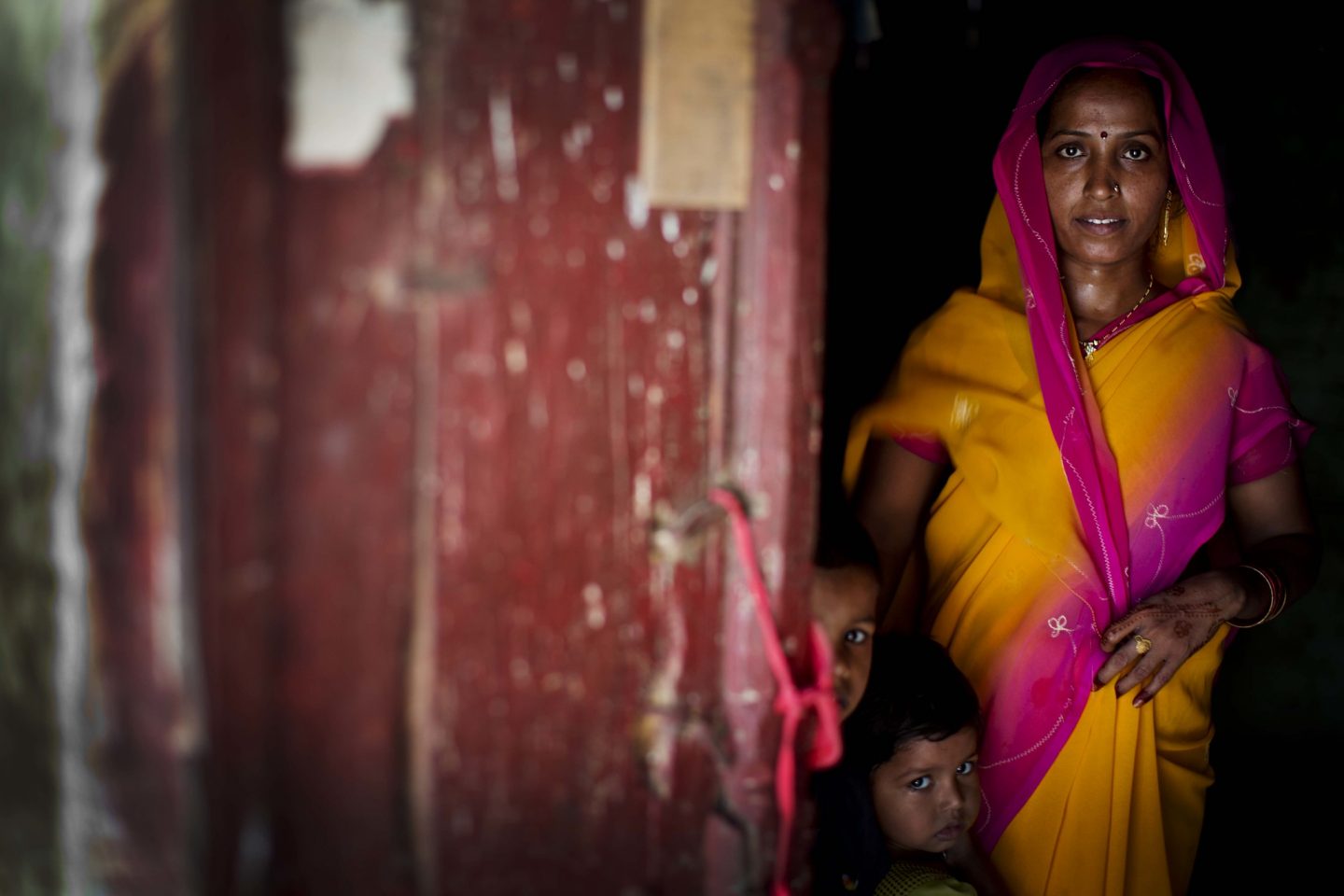
Country Contact
Somesh Kumar, Country Director
Tel. 91 11 49575100
Prius Platinum
A Wing, 5th Floor, D3, P3B
Saket District Centre, Sector 6
Saket, New Delhi, Delhi 110017
Current and Recent Donors
Advance Family Planning
Gates Foundation
Children’s Investment Fund Foundation
David and Lucile Packard Foundation
Dell, Inc.
Gavi, the Vaccine Alliance
Global Health Lab
Johns Hopkins University
Johnson & Johnson
MSD for Mothers
Novartis
Pharmarack
Reliance Foundation (ĀSMĀN)
Roche Pharmaceutical
Takeda Pharmaceuticals
Tata Trusts (ĀSMĀN)
UNFPA
UNICEF
Unitaid
University of Manitoba
USAID
World Bank
World Diabetes Foundation
World Health Organization
Since the 1980s, working to save lives and improve health for the most vulnerable.
- Under the RISE and NISHTHA projects, Jhpiego supported vaccine-related training in more than 1,500 facilities and trained more than 4,500 health care providers on various aspects of COVID-19 vaccination in India. RISE supported 227 model COVID-19 vaccination centers established across 17 states. These facilities have provided COVID-19 vaccination to more than 56 million people.
- Through its collaboration with the public and private sectors, Jhpiego helped ensure that competent health care workers provided high-quality maternal health and childbirth services for more than 11.3 million women across 15 states of India.
- Through its comprehensive primary health care strengthening programs, Jhpiego has provided technical assistance in establishing more than 66,900 Ayushman Arogya Mandirs across 14 states of India. These health and wellness centers cater to a population of 523 million, bringing comprehensive primary health care nearer to their homes.

Our Work in India
Comprehensive Primary Health Care - NISHTHA: Transforming Comprehensive Health Care in India
This five-year project, funded by USAID, aims to transform, redesign and re-engineer primary health care (PHC) in India for provision of equitable, comprehensive and client-centered PHC that contributes to improved health outcomes for marginalized and vulnerable populations. NISHTHA supports creating a strong, responsive, accessible, sustainable and affordable PHC system that ensures effective delivery of maternal, newborn, child and adolescent health services and integrates quality services for control of tuberculosis. NISHTHA is working to ensure availability of a skilled workforce, create sustainable training ecosystems and improve health care infrastructure and responsive health systems at the national level and across 12 states (Assam, Chhattisgarh, Jharkhand, Madhya Pradesh, Odisha, Arunachal Pradesh, Manipur, Meghalaya, Mizoram, Nagaland, Sikkim and Tripura). Core areas of support include: 1) providing technical assistance for rollout of the Government of India’s flagship Ayushman Bharat Health and Wellness Center program, which aims to achieve universal health coverage in India; 2) creating an ecosystem for designing, incubating and testing innovative solutions; and 3) fostering strategic partnerships between the public and private sectors to strengthen comprehensive PHC and ensure effective delivery of maternal and child health and tuberculosis services and the School Health and Wellness program. Jhpiego is also establishing learning labs across the country, upgrading and operationalizing 30,050 health facilities into functional Health and Wellness Centers, and empowering 24,000 community health officers to lead PHC teams—thereby providing approximately 143 million people with access to high-quality, comprehensive PHC services.
MOMENTUM Country and Global Leadership
MOMENTUM is a suite of projects, funded by the U.S. Agency for International Development, that aims to accelerate reductions in maternal, newborn and child mortality and morbidity in high-burden countries by increasing host country commitment and capacity to provide high-quality, integrated health care. Each of the projects has a specific focus area; together they provide a comprehensive, flexible package of support for countries as they overcome context-specific health challenges towards sustainable development. The six-year, Jhpiego-led MOMENTUM Country and Global Leadership project focuses on: 1) providing targeted technical and capacity development assistance to our missions, partner countries and local organizations; and 2) contributing to global technical leadership and policy dialogue for improved maternal, newborn and child health outcomes. Jhpiego’s sub-partners under this project are: Save the Children, Johns Hopkins University International Vaccine Access Center, Quicksand, Matchboxology, BAO Systems, Avenir Health, McKinsey and Company, PACT, Institute for Healthcare Improvement, Christian Connections for International Health and Ubora Quality Institute.
Reaching Impact, Saturation, and Epidemic Control (RISE): From COVID-19 Response to Building Health System Resilience
RISE worked as a vital partner in India’s response during the COVID-19 pandemic. More recently, recognizing the evolving nature of public health threats and the emergence of antimicrobial resistance and zoonotic diseases transmissible from animals to humans, RISE has shifted its focus to global health security, aligned with India’s programs like the National Action Plan for Antimicrobial Resistance and National One Health Program for Zoonoses. Collaborating with national-level stakeholders, such as the National Centre for Disease Control and the Department of Animal Husbandry and Dairying, RISE is strengthening early detection and response, enhancing laboratory capacity and investing in workforce development. Ultimately, these efforts aim to build a more resilient public health system in India, better prepared to tackle future global health challenges such as disease outbreaks and pandemics.
RISE is a five-year global project—funded by the U.S. President’s Emergency Plan for AIDS Relief (PEPFAR) and U.S. Agency for International Development—that works with countries to achieve a shared vision of attaining and maintaining epidemic control, with stronger local partners capable of managing and achieving results through sustainable, self-reliant and resilient health systems. The project is led by Jhpiego with the following partners: ICAP at Columbia University, Management Sciences for Health, Anova, BAO Systems, Johns Hopkins University Center for Public Health and Human Rights, and Mann Global Health.
Comprehensive Primary Health Care–Strengthening roll-out of Health and Wellness Centres (HWCs) in Uttar Pradesh
This three-year project, funded by the Gates Foundation, seeks to strengthen the delivery of comprehensive primary health care in the state of Uttar Pradesh. Jhpiego works with the National Health Mission-Uttar Pradesh to ensure availability of a skilled health workforce, the creation of a sustainable capacity-building system, upgraded health care infrastructure and responsive health systems enabling improved health outcomes in the state. The project strives to integrate maternal, newborn, child and adolescent health services as a part of essential primary health care services and strengthen linkages to ensure a continuum of care for various essential health services. By end of project, 21,113 health facilities will be transformed into operational Ayushman Bharat-Health and Wellness Centres, catering to the health needs of the population of Uttar Pradesh.
Strengthening Quality Antenatal Care – Born Healthy 2.0
Funded by the Children’s Investment Fund Foundation, the Born Healthy program seeks to improve the quality of antenatal care and reduce the prevalence of low birthweight (LBW) babies (weighing less than 2,500 grams at birth). While India has made progress on multiple child health indicators, the prevalence of LBW has been stagnant for nearly a decade. Phase 1 of the Born Healthy program (2017–2022) successfully addressed this challenge in Rajasthan, with women who presented early for their first antenatal care visit, reducing instances of LBW by 30%. The program delivered an evidence-based package of services, through the existing government infrastructure, that improved the quality and coverage of antenatal care, with a special focus on maternal infections. Phase 2 (2023–2028) builds on learning from Phase 1 to scale up the program in 25 districts of nine states (Assam, Himachal Pradesh Jharkhand, Karnataka, Madhya Pradesh, Maharashtra, Odisha, Punjab and Rajasthan). Jhpiego is also developing the capacity of national and state government institutions as well as sharing evidence to inform government budgetary inclusions for sustainability and further expansion in all 271 districts (with a potential to avert 200,000 LBW babies annually).
Integrated Women in Health Network Project
Takeda Pharmaceuticals supports the Jhpiego-led, five-year Integrated Women in Health Network (iWin) project, which addresses systemic and operational challenges in the delivery of maternal and newborn care in India. The iWin project is doing this by leveraging new advancements, technology and finance to create a maternal and child health unit that will: 1) create an integrated platform for delivery and access to antenatal, postnatal and intrapartum care services across the public health system; 2) integrate machine learning and predictive analytics; 3) integrate point-of-care diagnostics; 4) leverage innovative financing tools and long-term partnership mechanisms to increase domestic resource mobilization and facilitate government participation and buy-in; and 5) empower auxiliary nurse midwives and Accredited Social Health Activists to deliver client-centered, continuous and coordinated antenatal and postnatal care. Consortium partners include Intellecap and Accenture Development Partnerships.
Risk Stratification India–Connected Devices (RSI-CD)
Funded by the Gates Foundation, this program is an extension of the previously implemented Antenatal Risk Stratification–Intelligent Continuum of Care (ARS-iCoC) program, which enabled unique digital longitudinal tracking of high-risk pregnant mothers, thereby contributing to improving the quality of essential data with adequate provision of point-of-care diagnostics and their direct integration with the digital platforms across the targeted sites. RSI-CD will validate the ARS-iCoC interventions through proof of implementation while establishing their effectiveness. It will also identify and evolve intervention strategies to use sustainable point-of-care diagnostics, digital continuums, referral systems and early risk identification to improve maternal and perinatal outcomes. The goal of the program is to strengthen the digital pathways to the continuum of care, focused on: closing loops and strengthening referral and follow-up pathways; improving categorization of pregnancies into normal vs. high-risk; ensuring a high proportion of pregnancies are tracked through the continuum, including their management and outcomes; and improving data quality through sustainable, robust point-of-care diagnostics and devices. This program is being implemented in 333 facilities of Bundi, Karauli, Salumber and Udaipur districts of Rajasthan.
Mainstreaming Gestational Diabetes Mellitus
Funded by the World Diabetes Foundation, this program aims to integrate gestational diabetes mellitus (GDM) testing, diagnosis and management in the essential antenatal care package for early diagnosis and timely management of GDM. GDM, or impaired glucose tolerance with the onset or first recognition during pregnancy, is one of the most common medical conditions encountered during pregnancy, affecting one in seven live births in the world. In India, GDM prevalence is estimated at 10–14.3% and is expected to increase to 20%. Despite a high prevalence of GDM in Indian women, provision of GDM diagnosis and management services were not implemented universally as part of the essential antenatal care package. Jhpiego is providing technical support to the government of Madhya Pradesh and Maharashtra in implementation of GDM national guidelines through capacity building of service providers, ensuring supplies availability, supervision, monitoring and health systems strengthening.
New Antenatal Model in Africa and India (NAMAI) Study
With funding from the World Health Organization (WHO), Jhpiego is implementing a multi-country implementation research in four countries, including India, to improve antenatal care using WHO recommendations. In collaboration with Ministries of Health and research partners, the study uses implementation science to systematically introduce and test the applicability of the adapted WHO antenatal care package in selected study sites. The NAMAI study will try to answer research questions around adherence, effectiveness, acceptability, fidelity and cost implications of implementing the country/state-adapted antenatal care package. In India, this research is being implemented in two states (Assam and Tamil Nadu) to generate key evidence on the implementation of the country/state-adapted antenatal care package and inform future national adaptation and scale-up.
Accelerating Measurable Progress and Leveraging Investments for Postpartum Hemorrhage Impact (AMPLI-PPHI)
This multi-country project is catalyzing the introduction and adoption pathways for quality-assured drugs to treat postpartum hemorrhage (i.e., heat-stable carbetocin, tranexamic acid and misoprostol) through engagement and coordination with country governments and key stakeholders. The project aims to reduce maternal mortality and morbidity by making sure the right drug is in the right place at the right time for the right indication. Funded by Unitaid, AMPLI-PPHI is led by Jhpiego and supported by consortium partners PATH and the International Federation of Gynaecology and Obstetrics (FIGO). In addition to operating in four target countries (the Democratic Republic of Congo, Guinea, Kenya and India), an additional 13 other influence countries are benefitting from country and learning exchanges as well as from the sharing of project learning, resources and tools. For more information, please visit the project website.
Differentiated TB Care
With funding from the U.S. Agency for International Development through John Snow, Inc., Jhpiego is demonstrating a comprehensive model of differentiated care services for TB patients at the primary health care level. The model links the primary health care level with secondary and tertiary care levels in ensuring a continuum of care for TB patients. Technology is at the core of this model and is used to strengthen linkages in the continuum of care. Jhpiego is measuring the preliminary impact of the model and generating evidence on its operational feasibility and the barriers and facilitators for its scale-up.
Strengthening Quality of Nursing Ecosystem, Family Health and MNCH+A in Uttar Pradesh
To synergize the Uttar Pradesh Technical Support Unit’s efforts in improving maternal, newborn, child and adolescent health (MNCH+A) in the state, Jhpiego, supported by the University of Manitoba and the Gates Foundation, has partnered with the Government of Uttar Pradesh and India Health Action Trust as a technical agency for family health, maternal/newborn health and nursing programs. Program objectives include:
- Family health: Strengthen the system by delivering innovative solutions to improve access to quality family health services and quality childbirth services
- Maternal, newborn and child health: Improve the quality of care in maternal and neonatal services across public and private sector institutions modeled in selected districts
- Nursing: Provide technical assistance to the Medical Education Department, Government of Uttar Pradesh, to strengthen the system of pre-service and in-service education in the state
The project is developing a robust health system that ensures efficient program implementation by building capacity of service providers and program managers, working with program managers to address program gaps and bringing in process flow innovations, setting up robust review mechanisms that effectively use data for planning and decision-making, and leveraging digital technology in ensuring program outcomes.
Transforming the Nursing Workforce in Bihar through Mission Unnayan
In March 2024, in recognition of the crucial role played by nursing professionals in health care delivery, the Government of Bihar launched the “Mission Unnayan” program to enhance and improve the quality of pre-service nursing education as well as introduce major reforms to transform the nursing workforce in the state. This program is supported by the Gates Foundation in collaboration with Jhpiego, University of Manitoba and Piramal Foundation. The aim of the program is to rate colleges against benchmarking parameters and make the ratings public on the official website of the Bihar Nurses and Registration Council to provide transparency to the students and parents in making informed decisions, and to support the institutions in identifying areas of improvement in the quality of teaching and training, thereby improving the overall standard of nursing education in the state. Quality enhancement, transparency and skill development are a few initiatives to elevate the nursing profession’s standards and contribute to the overall improvement of health care services in the state. Mission Unnayan endeavors to create a sustainable framework for collaborative efforts and strategic partnerships, nurturing a skilled and competent nursing workforce capable of meeting Bihar’s evolving health care challenges.
Strengthening Nursing Education and Nursing Cadre in Assam
Supported by the Government of Assam, the World Bank and the Assam Health Infrastructure Development and Management Society, Jhpiego is redesigning the landscape of health through nursing in the state of Assam by strengthening nursing education and service, research, digital innovation and practice. To achieve the vision of health care that depends on a transformation of the roles and responsibilities of nurses, this intervention aims at major changes in the existing health care system and practice environments, as well equally profound changes in the education of nurses both before and after they receive their license. Strengthening nursing education is a cornerstone of the overall efforts by transforming nursing education to prepare nursing graduates to work collaboratively and effectively with other health professionals in a complex, evolving health care system in a variety of settings. This strengthening is being undertaken by providing technical support to establish at least two Centers of Excellence in the state, augmenting nursing leadership and administration, improving the quality of nursing education, successfully introducing competency-based education and improving nurse data management systems.
PRERANA – Promoting Health Access for Northeast India
Funded by the U.S. Agency for International Development, this five-year initiative is dedicated to strengthening family health services in the eight northeastern states of India by developing innovative solutions and supporting local government, private sector and civil society.
VISTAAR: Strengthening the Midwifery Services Initiative in UNFPA Focus States
This three-year program aims to improve maternal and newborn health outcomes by strengthening midwifery education in UNFPA-focused states in India. Jhpiego is providing technical expertise for the creation of a sustainable, comprehensive educational ecosystem for the Nurse Practitioner in Midwifery along with the planning, establishment and operationalization of Midwifery-led Care Units. Jhpiego is working closely with the Indian Nursing Council and the Ministry of Health and Family Welfare in reviewing the existing curriculum and the regulation of the midwifery workforce in the advanced practice role of Nurse Practitioner in Midwifery.
India Update
Bridging the Gap: Sikkim’s Health and Wellness Centres as Vital Links in Climate-Resilient Care
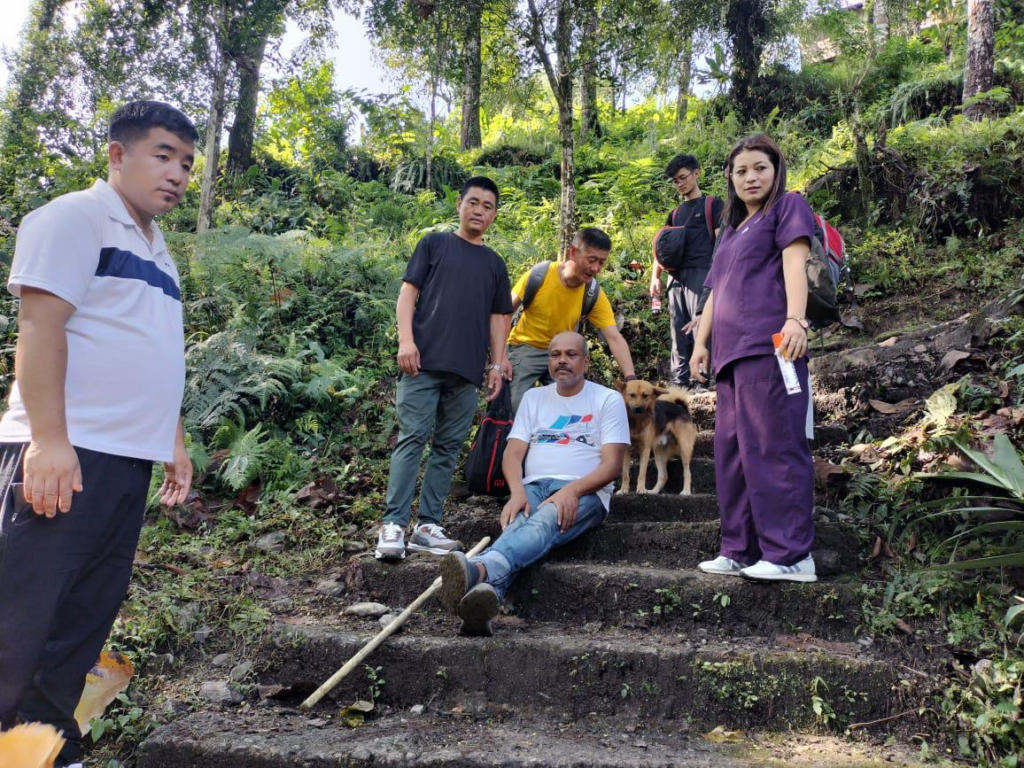
It was a day like any other when Sonamkit Lepcha, the Community Health Officer (CHO), at Lingdong SHC-HWC, North Sikkim, embarked on her usual journey to provide medical aid to the community, unaware of the trials that awaited her. Little did she know, the upcoming days would demand more courage, resilience, and compassion than ever before.
The tranquil flow of the Teesta River suddenly transformed into a turbulent force, engulfing bridges, the Chungthang Dam, and vast areas of villages and towns in North Sikkim. This calamity, accompanied by cloudburst triggered a Glacial Lake Outburst Flood, sent shockwaves through the region, impacting thousands of individuals. The aftermath of the floods was heavy silt, stagnant water, decomposing corpses, and a horde of airborne and water borne diseases.
There was no power for days. During nights we could hear the gurgling sound from the river, as it is flowing forcefully- and would vanish everything,”
Sonamkit recalled.The people we serve
Country Contact
Somesh Kumar, Country Director
Tel. 91 11 49575100
Prius Platinum
A Wing, 5th Floor, D3, P3B
Saket District Centre, Sector 6
Saket, New Delhi, Delhi 110017
Current and Recent Donors
Advance Family Planning
Gates Foundation
Children’s Investment Fund Foundation
David and Lucile Packard Foundation
Dell, Inc.
Gavi, the Vaccine Alliance
Global Health Lab
Johns Hopkins University
Johnson & Johnson
MSD for Mothers
Novartis
Pharmarack
Reliance Foundation (ĀSMĀN)
Roche Pharmaceutical
Takeda Pharmaceuticals
Tata Trusts (ĀSMĀN)
UNFPA
UNICEF
Unitaid
University of Manitoba
USAID
World Bank
World Diabetes Foundation
World Health Organization



